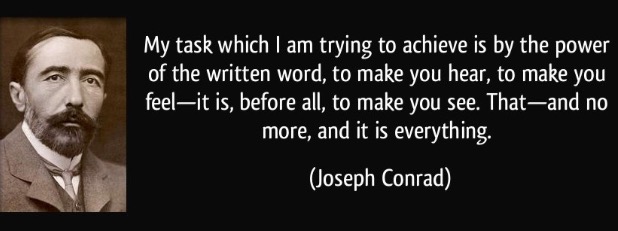
The goal of the ASAM has always been to get the medical establishment to accept 12-step spiritual recovery.
According to the American Society of Addiction Medicine The ASAM Principles of Addiction Medicine is the “go-to textbook in the specialty of addiction medicine” and:
The 4th Edition of The ASAM Principles of Addiction Medicine contains an entire section entitled “Mutual Help, Twelve Step, and Other Recovery Programs” containing three chapters entitled “Twelve Step Programs in Recovery,”1 “Recent Research into Twelve Step Programs”2 and “Spirituality in the Recovery Process.”3
Despite the all-encompassing title of this 31-page section (pages 911-942) no “other recovery programs” are described. In fact, no other programs bar 12-step ideology are even mentioned.
I have read through each chapter word-for-word three times just to be sure; and although the chronic relapsing brain disease model of addiction requiring lifelong abstinence and spiritual recovery is described, trumpeted and proselytized in great detail, not one other model of addiction is even named.
As with anything I write I encourage you to fact-check this. My goal here is to present my opinions with facts and evidence that can be checked and verified. Point out any errors of fact and I will promptly remove and correct them.
If a Cardiology textbook had a section entitled “Cholesterol, Statins and other Lipid Lowering Agents” with three chapters that only described Lipitor it would be correctly lambasted from every angle by the entire field of medicine as soon as it hit the shelves.
The lack of evidence-base and conflicts-of-interest would be recognized and dealt with immediately and when it was realized that many of the authors not only profited from, but based their very own cardiac health on Lipitor they would rightly be held accountable. Such is not the case in Addiction Medicine.
The validity and reliability of opinions lie in their underlying methodology and evidence base. Reliance on the personal authority of any expert or group of experts is the fallacy of appeal to authority.
An appeal to Authority is a fallacy with the following form:
- Person A is (claimed to be) an authority on subject S.
- Person A makes claim C about subject S.
- Therefore, C is true
The fallacy is committed when the person (or group) in question is not a legitimate authority on the subject. If person A is not qualified to make reliable claims about subject S then the argument will be fallacious. Since this sort of reasoning is fallacious only when the person is not a legitimate authority it is necessary that acceptable standards be set and the following standards are widely accepted.
- The person has sufficient expertise in the subject matter in question.
- The claim being made by the person is within her area(s) of expertise.
- There is an adequate degree of agreement among the other experts in the subject in question.
- The person in question is not significantly biased.
- The area of expertise is a legitimate area or discipline
With the exception of number 5 the ASAM fails on all counts, but policy makers, members of the press, politicians and others have been successfully bamboozled into believing the ASAM are indeed “experts” in Addiction Medicine. 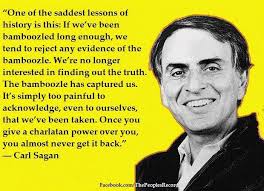 Over the years, the American Society of Addiction Medicine has continued to promote the AA position that alcoholism (and by inference any other addiction) is an illness which only a “spiritual experience will conquer.” All addictions are believed by ASAM to be caused by a lifelong chronic relapsing brain disorder that can only be treated by complete abstinence from all mood-altering substances (with the apparent exceptions of tobacco and caffeine interestingly) and the vast majority of ASAM doctors believe that the only effective treatment for addiction must include surrendering one’s “will and life over to the care of God.”
Over the years, the American Society of Addiction Medicine has continued to promote the AA position that alcoholism (and by inference any other addiction) is an illness which only a “spiritual experience will conquer.” All addictions are believed by ASAM to be caused by a lifelong chronic relapsing brain disorder that can only be treated by complete abstinence from all mood-altering substances (with the apparent exceptions of tobacco and caffeine interestingly) and the vast majority of ASAM doctors believe that the only effective treatment for addiction must include surrendering one’s “will and life over to the care of God.”
Because addiction is defined as a disease, addicts must be “treated” (often coerced) and “cured” (which is defined as remaining abstinent).
The medical profession needs to reexamine its role in Addiction Medicine.
Confusing ideological opinions with professional knowledge is unacceptable. Presenting it as textbook science is not only dangerous but fosters negligence, abuse of power, self-interest and prejudice on the part of the medical community with respect to the treatment of all patients.
To be clear, just as Lipitor may be the best treatment for some individuals with elevated cholesterol, AA and 12-step may be the best treatment for some individuals with addiction and substance use disorders. If it works for them, then more power to them. I have no problem with that.
What I do have a problem with is imposing and mandating any treatment on others.
Under a dictatorship everything else becomes subordinated to the guiding philosophy of the dictatorship. Corresponding doctrine replaces professional guidelines, standards of care, and evidence based medicine. And unfortunately in the case of Addiction Medicine the guiding philosophy often trumps autonomy and ethics.
Inherent in the current chronic brain disease model of addiction is the importance of external control over individuals. Political correctness and the oversimplified medicalization of addiction is allowing it. Demanding scientific literacy and discriminating good science from bad science would prohibit what is occurring and In order to save American Medicine this problem needs to be clearly recognized. Otherwise we will become a profession that is essentially defined by the false dichotomies and grand illusions defined by the impaired physicians movement.
- Schulz JE, Williams V. Twelve Step Programs in Recovery. In: Ries R, Fiellin D, Miller S, Saitz R, eds. Principles of Addiction Medicine. Baltimore: Lippincott Williams & Wilkens; 2009:911-922.
- McCrady BS, Tonigan GS. Recent Research into Twelve Step Programs. In: Ries R, Fiellin D, Miller S, Saitz R, eds. Principles of Addiction Medicine. 4 ed: Lippincott Williams & Wilkens; 2009:923-937.
- Galanter M. Spirituality in the Recovery Process. In: Ries R, Fiellin D, Miller S, Saitz R, eds. Principles of Addiction Medicine. 4 ed. Baltimore: Lippincott Williams & Wilkens; 2009:939-942.
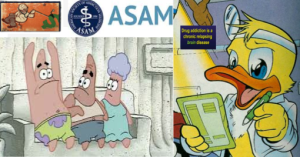



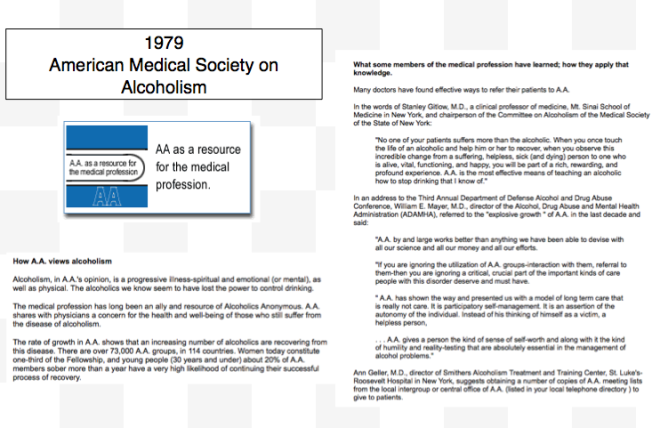
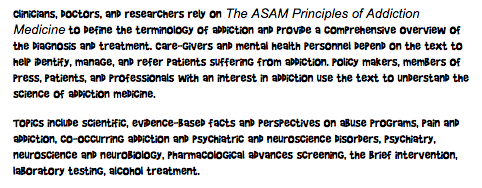

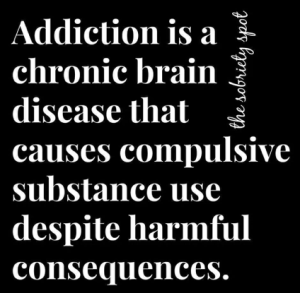


Reblogged this on Chaotic Pharmacology.
LikeLike
Reblogged this on Unchain The Tree.
LikeLike
Interesting point of view…thanks for this well researched article. I am pro-recovery, meaning that I am happy for anyone who can quit drugs and alcohol – regardless of the method. However, i got sober a long time ago when 12 step programs were the only option. Well that is not entirely true but i had about five dollars, to my name, so my choices were limited. What modern recovery approaches should be getting more attention? I did read about Naltrexone.
LikeLiked by 1 person
It needs to be individualized. These people are behind the 12-step monopoly and are forcing 12-step on all comers. I am not against 12-step but imposed 12-step. For those who don’t agree with it there are other options siuch as Rational recovery. But these people are diagnosing everyone with addiction and the new DSM makes it easier for them to diagnose and bill for it.
LikeLiked by 1 person
Dear Dr. Langan,
I read with interest this article.
I would like to quote: “What I do have a problem with is imposing and mandating any treatment on others.” – Agreed.
I just published some thoughts about forced 12-step rehap programs for addicts in this blog post (URL):
http://chaoticpharmacology.com/2015/01/08/should-addicts-be-forced-into-12-step-rehab-programs-no/
Kind regards,
Jorge
LikeLiked by 1 person
Sure Jorge -thank ypu. Let’s work on the PEth –
LikeLiked by 2 people
Reblogged this on Disrupted Physician.
LikeLike
[…] Source: Disrupted Physician 101.5: The American Society of Addiction Medicine (ASAM) uses (or misuses) Alcoh… […]
LikeLike